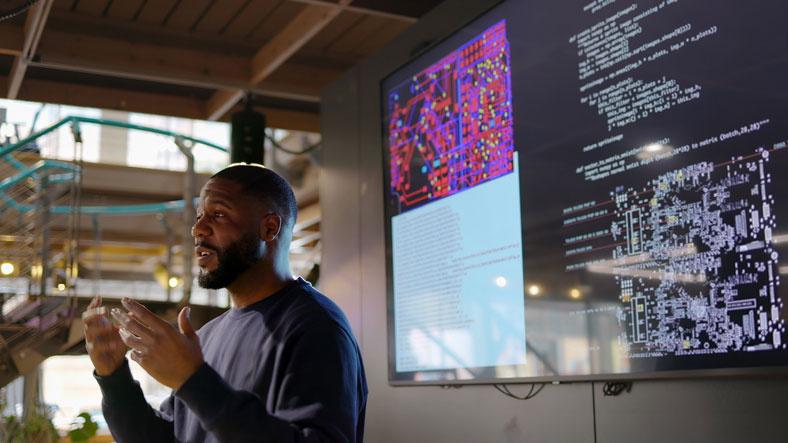Written by Scott Wilson
If you woke up some random morning in 2023 and suddenly noticed that you were seeing a lot of articles and social media posts about artificial intelligence that hadn’t been there the day before, no, you weren’t going crazy. A subject that was once reserved for science fiction and the distant halls of deep academia was suddenly a big deal on the world scene.
Google Trends shows the explosion clearly: from 2018 to November of 2022, global interest around the search term for artificial intelligence started creeping up. The term GPT, of course, didn’t even exist.
But between late November ‘22, when OpenAI released their first public preview of ChatGPT, and early December, searches for those terms more than doubled. By July of 2023, it doubled again… remarkable evidence of wide scale interest all over the world.
It’s clear already that the field is going to have both big social and economic impacts on our world. And that makes it an important subject at the universities that are training the workforce for the future.





Overnight, from a niche field of mostly theoretical exploration to a mass-market phenomenon with applications in every industry, AI has become an important field of study.
If you’re interested in becoming one of the elite graduates who hold a degree in AI or one of its key sub-fields, you have every reason to be interested in how those degree and certificate programs evolved.
Higher Education Is the Well-Spring of AI Development, but Has Been Slow to Develop Programs
 Universities are big, bureaucratic institutions that don’t always move fast when the ground shifts in a fast-moving field like technology.
Universities are big, bureaucratic institutions that don’t always move fast when the ground shifts in a fast-moving field like technology.
When you think about what a college degree is, and what it represents, this is no surprise. It takes a while for both commercial and academic worlds to settle on definitions. What kind of knowledge is universally important to AI engineers? What are the minimum standards for skills? What kind of practical expertise does a degree represent?
As schools and industry hammer these things out, there is a kind of built-in lag between hot new developments in AI and the state of education in the field.
Even today, there are fewer than 50 dedicated master’s degree programs in the country for artificial intelligence studies according to ’22-’23 academic year data published by the National Center for Education Statistics (NCES).
But universities are and have been where the big moves are being made to push the ball toward the goal line of building truly intelligent machines. As much as private industry has grabbed the bull by the horns, academia is still where you go to learn about and advance AI.
AI Education Goes Back to the Earliest Days of Computing
These new degree options in artificial intelligence didn’t spring up out of nowhere. Artificial intelligence research has been happening in fits and starts at prominent universities since at least the 1950s.
Like other new fields, it grew out of established sciences being combined and taken in new directions. Some of the groundwork for the widespread use of neural networks today came out of research in psychology, logic, and neuroscience initiated in the 1940s.
The Dartmouth Workshop: Where It All Began
 If there’s a birthplace for the modern field of artificial intelligence studies, it is Dartmouth Summer Research Project on Artificial Intelligence. Held at Dartmouth College in Hannover, New Hampshire, the summer workshop was credited for both inventing the term artificial intelligence and kicking off a concerted effort to develop genuinely intelligent machines.
If there’s a birthplace for the modern field of artificial intelligence studies, it is Dartmouth Summer Research Project on Artificial Intelligence. Held at Dartmouth College in Hannover, New Hampshire, the summer workshop was credited for both inventing the term artificial intelligence and kicking off a concerted effort to develop genuinely intelligent machines.
Many of the participants imagined they would achieve success within a decade.
While that estimate proved to be wildly optimistic, the workshop was in other ways enormously prescient. Luminaries like Marvin Minsky, John McCarthy, John Holland, and Claude Shannon hammered out ideas for AI concepts like natural language processing, neural networks, and a theory of computation that are still critical today. Another attendee, Nathanial Rochester, was the chief architect of the IBM 701, the first machine programmed for machine learning that beat a checker’s master at his own game.
As often happens when big brains gather, however, there was little agreement on standards or methods. McCarthy, the organizer behind the workshop, reportedly considered it a failure.
But a thousand flowers bloomed in its wake. If there was little agreement, there were many promising ideas. The surge in investigation and invention after the workshop was astounding. But by the mid-1970s, most of the avenues of research opened up had hit a wall. Funding dried up, and development slowed.
The foundations were laid, though. Many of the most exciting progress happening in AI research at universities today builds directly on the visionary work of the Dartmouth Workshop.
In 1959, the Artificial Intelligence Laboratory was founded at the Massachusetts Institute of Technology. Across the country, at West Coast tech powerhouse Stanford, they were a little slower off the blocks, not revving up their own SAIL (Stanford Artificial Intelligence Laboratory) until 1963 (with no lesser light than John McCarthy at the helm).
Artificial Intelligence Education Draws from Many Wells for Inspiration
 Without focused degrees in artificial intelligence available, many graduate students working on research and development in the field relied on other majors. PhD and master’s degrees in mathematics, physics, computer science, and even electrical engineering were often the first choice for anyone doing focused work in AI in the early days.
Without focused degrees in artificial intelligence available, many graduate students working on research and development in the field relied on other majors. PhD and master’s degrees in mathematics, physics, computer science, and even electrical engineering were often the first choice for anyone doing focused work in AI in the early days.
As you explore the opportunities for AI education today, you’ll see bits and pieces of those fields popping up repeatedly in the curriculum. They run alongside newer but equally important fields in AI like data science and informatics.
And even today, some of the luminaries in the field got there with degrees that don’t say AI on the label. They forged their own path and created a new field for the next generation.
The State of Artificial Intelligence Education Today
The wide range of ideas and processes that have emerged from AI research has created a wealth of variety in AI education today. You’ll find degrees in AI that come not just from the world of applied AI research itself, but along the many tributaries to that subject, as well:
- Data Science
- Computer Science
- Engineering
- Informatics
- Research
Many of these are far older degree programs that have recently started to incorporate specializations in AI. In other cases, they have reoriented their curriculum to reflect the importance of AI in their respective fields today.
AI Education Primarily Happens at the Graduate Level
 In almost every case, though, the evolution in AI education has trended toward graduate degrees.
In almost every case, though, the evolution in AI education has trended toward graduate degrees.
A master’s or higher is widely understood to be a necessity when it comes to mastering all the advanced concepts and cutting-edge practices used in artificial intelligence engineering today.
There are several features of a master’s or doctoral program that make them ideal for AI education.
First is that advanced level of mastery. Since it takes a bachelor’s degree just to get in the door to master’s studies, every grad student automatically has at least four years of training behind them to cover the foundational necessities of AI studies. In many cases, that comes through bachelor’s programs in math, science, or computer science. All the basic concepts of computing, statistics, and higher math have already been covered. That allows master’s students to dive right into advanced AI studies.
Second is the research that comes built-in to graduate programs. Students at the master’s level and above are expected not just to sit around and absorb information out of textbooks. They are engaged in directed research in new concepts and questions in AI.
That is not just an aid to developing more in-depth understanding. It’s also a key part of AI engineering today. The most effective ways we have of building AI right now all revolve around building and running experiments. A thorough understanding of research design and processes is critical on-the-job preparation for AI engineers.
Third, graduate studies allow personalization to some level. Whether it is through your choice of electives or concentrations, or by selection of a particular topic for capstone project or thesis paper, you can engage in a bit of the spirit of the AI pioneers by angling into the ideas that most interest you.
Flexibility in AI Education Caters to Students Coming in From a Range of Backgrounds
 As a field centered in technology, AI education doesn’t shy away from using the latest technological developments in teaching for students.
As a field centered in technology, AI education doesn’t shy away from using the latest technological developments in teaching for students.
Online degree and certificate programs are common. By leveraging streaming, group communication, and remote cloud instances for high-power computing research, students from anywhere in the world can collaborate and absorb the lessons necessary to master AI engineering.
A fully online master of science in artificial intelligence from a top-ranked university isn’t hard to find… though it might be challenging to get in to.
For students who prefer to learn in person, there are plenty of traditional, on-campus degree and certificate options for AI training. The brainstorming and collaboration of the old-school classroom still has a role for some students with the time and interest to attend.
Finally, hybrid format programs put together both in-person and remote learning to get the best of both worlds. While the value of in-person collaborative study is high, the individual effort needed to study and succeed doesn’t always have to be made in a classroom. These programs mix and match class formats, or sometimes offer primarily online study combined with occasional on-campus intensives.
The Types of Degrees and Specializations in Artificial Intelligence Reflect an Evolving Field
 AI education is even coming full circle, taking up residence in other majors just as it once lived within the walls of compsci and engineering degrees. The University of Texas began offering a dual major in medicine and AI in 2023. You’ll find people specializing in unusual new areas like computational social science and trustworthy Machine Learning.
AI education is even coming full circle, taking up residence in other majors just as it once lived within the walls of compsci and engineering degrees. The University of Texas began offering a dual major in medicine and AI in 2023. You’ll find people specializing in unusual new areas like computational social science and trustworthy Machine Learning.
But it’s not the wild west. AI education has become formalized in the past couple of decades. That’s a benefit to employers, who want to know the graduates they hire have a consistent set of skills, and students, who want to get an education the industry is guaranteed to value.
Curriculum Standards Have Come to AI Degree and Certificate Programs
AI education isn’t new, but it doesn’t look very much like it used to. While the early innovators were forced to put together their own courses of study out of necessity, formal degrees have leveled out what AI degrees look like today.
Some of those standards that John McCarthy had been hoping would come out of the Dartmouth Workshop have finally arrived in AI education. Common coursework in most AI graduate-level programs includes subjects like:
- Overview of Artificial Intelligence
- Machine Learning and Neural Networks
- Algorithms in Data Science
- Cognitive Science and Reasoning
- Ethics in Artificial Intelligence
But, both because of the need for experts in other fields to get up to speed in AI subjects, and because of the range of specializations available in the field, there are many focused certificates and stand-alone courses on offer in the field too. Just a scattered selection of those programs include:
- Machine Learning and Deep Neural Networks
- Computer Vision
- Robotics and Automation
- Cybersecurity
- Data Mining
In many of these fields, there’s a strong hands-on component. Building a self-driving car or teaching a robot how to jump rope is all part of the experience.
There’s also a lot of crossover with companies and other organizations actively developing AI. AI education has always been an incubator for new commercial AI projects. Many of those reach back into academia when they need additional expertise.
So most AI education today offers some opportunity to work on live projects happening out in the real world.
The Current World of Degrees and Certificates in Artificial Intelligence
 The full range of education options means a wealth of different formats. With students coming into AI from both established careers in engineering and computer science as well as straight out of high school, different kinds of programs are needed. Many of the people doing critical work in AI today graduated well before real degrees in the field were being offered. Yet they stand to benefit just as much from formal education in AI as new students.
The full range of education options means a wealth of different formats. With students coming into AI from both established careers in engineering and computer science as well as straight out of high school, different kinds of programs are needed. Many of the people doing critical work in AI today graduated well before real degrees in the field were being offered. Yet they stand to benefit just as much from formal education in AI as new students.
Master’s programs in artificial intelligence are one-to-two-year programs that deliver the full range of specialized study and research in AI. They come with many specialization options, but all include the standard framework for understanding and working in AI engineering as part of the package.
Certificate programs in artificial intelligence are shorter and more focused, often lasting a year or less. They are designed to complement prior studies in core fields like data science, computer science, or engineering with specific AI coursework. They also offer specializations but are designed to be stacked on experience and previous study in STEM fields.
In many cases, certificates are offered by the same universities offering full degrees. The certificate will include a subset of the classes required for the degree. Otherwise, they are taught by the same instructors and cover the same materials.
Although they aren’t the final step on a journey to a career in AI engineering, some schools are also beginning to introduce bachelor’s degrees in AI to help you get the right groundwork for graduate study in the field.
Some of these programs offer prerequisite coursework as part of the package. With professionals coming to AI from all kinds of backgrounds, the strong foundations in math, statistics, and programming that are necessary for master’s-level studies haven’t always been set. But many colleges recognize the need for catch-up courses and offer them to help students from all backgrounds get up to speed.
In the grand scheme of things, despite all the advances and advantages in AI education since its inception, these are still pioneer days for the field. With the profession, applications, and raw science of AI engineering still in flux, you have the opportunity to help mold the future of education even as you receive it.






